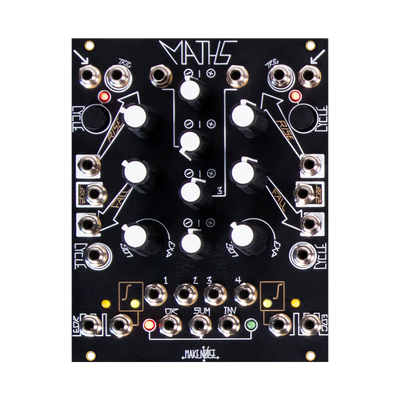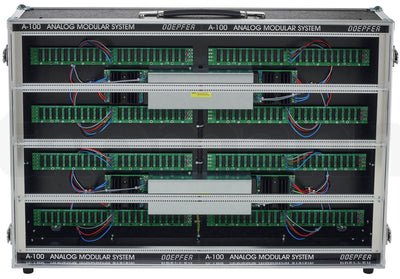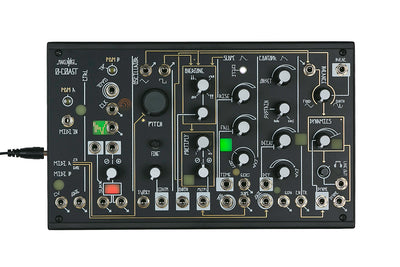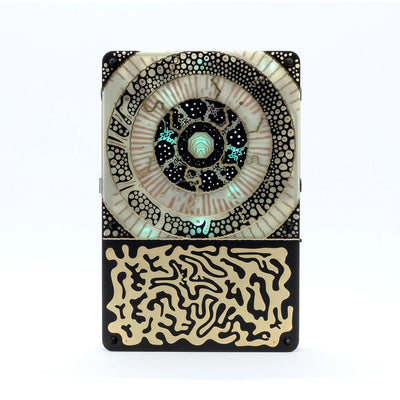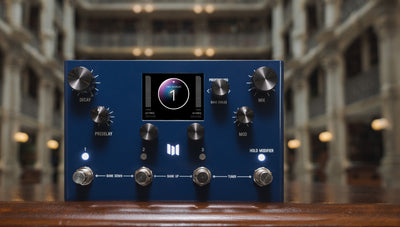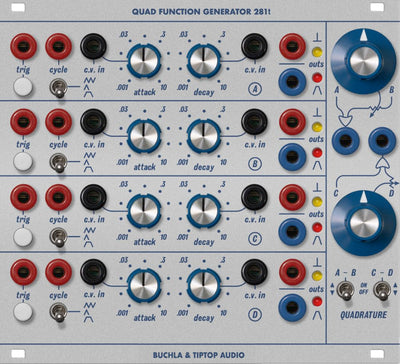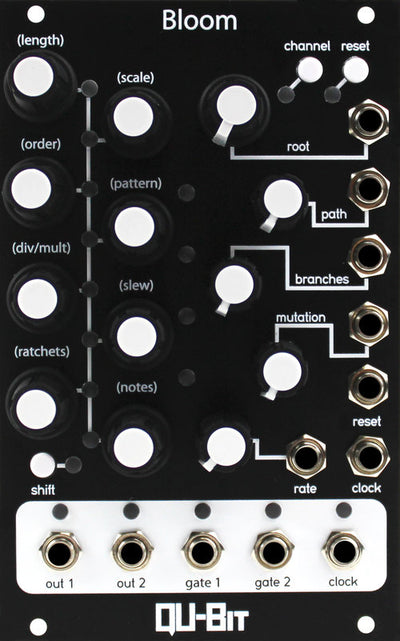Modular Transformation Machine.
Expand the sound of your modular rack with incredibly lush, ethereal reverbs. Enhance signals with gorgeous chorus, flanging, and modulated delays. Create uniquely expressive synth voices with Karplus-Strong string synthesis. Turn simple mono audio signals into vast stereo soundscapes. StarLab is a single module that will completely transform your modular rack.
Singular Modular Reverb.
From perfectly voiced room ambience to vast, immersive, nearly infinite decays, StarLab offers the pinnacle of premium reverb sounds with unparalleled depth and spaciousness. Add musical intervals to the reverb signal with Shimmer, and enhance the harmonic spectrum with Glimmer, while enjoying real-time control over the size/pitch of the reverb process.
Modulation And Delay Effects.
StarLab has vastly expanded what reverb pre-delay can do by allowing you to bus the pre-delay signal to the output while making the pre-delay time a modulation target. This results in the ability to create rich choruses, sweeping flanger effects, and beautiful modulated delays, while also processing signal through the reverb.
Karplus-Strong String Synthesis.
In addition to input signal processing, StarLab is a powerful Karplus-Strong string synthesis voice module that allows freely alternating bowing and plucking as well as dynamic string damping. This results in an astoundingly expressive and lifelike instrument with a unique voice all its own, which can be enhanced and expanded by the full range of StarLab’s reverb capabilities.
Intuitive Creation Station
What is StarLab?
Development for StarLab began with one goal in mind: to provide the highest quality reverb possible for modular systems, perfectly tuned for immersive electronic soundscapes with a high degree of flexibility and creative control.
The seemingly simple idea of allowing the pre-delay signal to be fed directly to the module’s output led to the development of rich sounding delay, chorus, and flanger effects, all of which can be used together with or independent of the reverb.
While experimenting with short delay times using feedback and filtering, we began finding very musical and expressive Karplus-Strong string synthesis sounds, and realized that StarLab could move beyond signal processing and become a truly unique voice module as well.
All this ultimately resulted in the creation of a module that is equal parts reverb, delay/modulation, and playable instrument.
Choose Your Character.

StarLab gives you three distinct Reverb textures to choose from: Sparse, Dense, and Diffuse.
The Sparse reverb creates reflections that are far enough apart from each other to be audibly distinct. Legato notes create a lush but pleasingly clean sound field, while staccato notes reveal individual echoes in a way that is well suited for sound design and special effects.
The Dense reverb texture is an immediate-response reverb with a smooth sound field, featuring sonic characteristics similar to a plate. This texture is well-suited for applications ranging from small space ambience all the way to large cavernous reverbs.
The Diffuse reverb creates a slow-building, atmospheric wash that excels at ambient, swell, and even reverse-like textures. The Diffuse reverb deconstructs and spreads transients over time to achieve its bloom-like effect.
Over and Over Again.
 StarLab’s Delay section is actually a vastly expanded reverb pre-delay.
StarLab’s Delay section is actually a vastly expanded reverb pre-delay.
When used as a reverb pre-delay, delay FEEDBACK is still available, allowing for the creation of even longer reverb decays, while the ability to modulate the pre-delay time allows even further creative possibilities.
Press the ECHO ON button, and now you can create a wide variety of classic delay and delay-reverb effects.
Echoes can be synced to an external clock with the DELAY/TUNE knob acting as a clock multiplier/divider for the echo repeats. Delay time can also be set by tapping a tempo using the TAP/TRIG button.
Modular Modulation.
 StarLab provides a wide range of modulation effects to add fatness and movement to your sound, all available on their own or in addition to StarLab’s reverb.
StarLab provides a wide range of modulation effects to add fatness and movement to your sound, all available on their own or in addition to StarLab’s reverb.
The short-delay portion of the DELAY/TUNE knob is tapered to make it easy to dial in a variety of rich chorus and swirling flanger effects when modulated by StarLab’s internal LFO. Use the dedicated FEEDBACK knob to add resonance and musical harmonic sweeps to flanger effects. Make your oscillators sound huge with lush, shimmering organic chorus. Set the DRY level to minimum for classic vibrato effects.
Moving Targets.

StarLab’s LFO features triangle, square, ramp, saw, random, and envelope waveforms that can be used to modulate your choice of three targets:
Send the LFO signal to the delay section for modulated echo effects or for modulated pre-delay signal within the reverb. You can also create classic modulation effects such as flanger, chorus, and vibrato. In Karplus-Strong mode, the string tuning is modulated.
Send the LFO signal to modulate the SIZE / PITCH (process rate) of the reverb core for effects ranging from mild to wild and even on to music-generating: In Quantize mode, signal from the LFO will be quantized to any of 15 different scales as it modulates the SIZE / PITCH parameter.
Or send the LFO to the filter for a variety of effects. Activate the 24dB/oct low pass filter for classic filter mod effects, or achieve more subtle filter modulation of the reverb’s HIGH DAMP. In Karplus-Strong mode, modulating the HIGH DAMP parameter creates lifelike dynamic string damping.
When clocked externally via CV, the LFO SPEED knob becomes a clock multiplier/divider. You can also connect an external LFO or function generator to StarLab’s EXT LFO IN and direct that signal with StarLab’s Target switch, controlling amplitude with the DEPTH knob.
Expanding Universe Reverb.

StarLab opens up a universe of possibilities by using a variable rate process to expand and contract the reverb core size.
This changes the reflection density and response of the reverb while retaining the integrity of the audio within the reverb.
The result is a reverberated signal that can be transposed, pitch modulated, and creatively tweaked for an endless variety of sonic characters and hypnotic soundscapes.
Sonically Beautiful Reverb Repitching.

Inspired by the classic shimmer effects pioneered in the ’80s using digital reverbs and pitch shifters, StarLab’s Shimmer voice is carefully created from the reverberated signal itself to generate maximum radiance and beauty.
Call forth deep, low ambient string sections with the octave down setting, or spacey ethereal textures with octave up.
In between the octaves are several musically interesting intervals available for shifting the harmonic structure of the reverb. Or use the INTERVAL CV input for semitone adjustment of the interval from an octave down to an octave up.
The Shimmer processing can be applied at the reverb input only, or can regenerate within the reverb core for ever-ascending or descending pitches as the reverb decays.
Harmonics In Motion.
 Glimmer creates an enhanced harmonic spectrum using an optimally tuned dynamic resonant network, resulting in mysterious shifting harmonic textures.
Glimmer creates an enhanced harmonic spectrum using an optimally tuned dynamic resonant network, resulting in mysterious shifting harmonic textures.
Press the HIGH BAND button to accentuate higher frequency harmonics, creating a washy, dreamy, ambient top end.
All Gain, No Loss.

Input Gain controls the gain of the input signal fed to the reverb structure using a soft clipping input stage.
This gives you the ability to add pleasing musical harmonic distortion to the signal being processed by the reverb.
A post gain signal level LED continuously indicates strength from clean (green) to heavy soft clipping (red).
Harmonic Sculpting Machine.

StarLab’s filter section is designed for intuitive, musical sound-sculpting of both the reverb signal and the Karplus-Strong string synthesis voice.
LOW DAMP is a powerful sound shaper for the reverberated signal. At minimum it allows extended lows to reverberate for cavernous possibilities. If the reverb tail gets muddy, a quick turn of the LOW DAMP knob can clean it up effectively. In Karplus-Strong mode, this control reduces the low frequency content of the string.
HIGH DAMP removes high frequency content from the regenerating reverb structure. In Karplus-Strong mode, this control functions as a string damper, dampening the high end harmonics as the string decays.
Press the LOW PASS button, and the HIGH DAMP function changes to a beautifully tuned classic 24dB/octave low pass filter applied at the output of the reverb. The low pass filter has adjustable resonance for dramatic filter sweeps.
In Karplus-Strong mode, this control functions as a string damper, dampening the high end harmonics as the string decays and conveying a variety of “right-hand” plucking techniques.
Suspended Animation.

StarLab’s INFINITE button freezes the audio at the input to the reverb core, while any new audio can still be processed by the reverb on top of the frozen audio.
Not only does this allow you to create a lush ambient bed for your other sounds to play over, it can be repitched to transform StarLab into a CV tunable synth voice, quantizable to 15 built-in scales.
In Quantize mode, the scale selection quantizes the SIZE / PITCH knob as well as the LFO (with Pitch as target), while the CV input is quantized to half-steps.


